| THE RUNNING MATE | |
August 8 , 2000 |
|
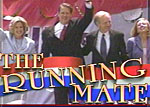
|
Al Gore officially announced Connecticut Senator Joseph Lieberman is his vice presidential choice in Nashville, Tennessee.
|
|
MARGARET WARNER: For a longer look at the history of breaking down barriers in politics, we turn to three NewsHour regulars: Presidential historians Doris Kearns Goodwin and Michael Beschloss; and journalist and author Haynes Johnson. Joining them tonight is Michael Lerner, editor of "Tikkun," a magazine on Jewish thought and culture. And he's also a rabbi at a San Francisco synagogue. Welcome all. Well, Haynes, Gore and Lieberman clearly saw his being Jewish as a thing of great... of deep significance, and it is, isn't it? |
||||||||||
| Breaking barriers | |||||||||||
|
MARGARET WARNER: Doris, how big a barrier do you see here being broken, and how it fits in, in sort of historical terms? DORIS KEARNS GOODWIN: Well, you know, I think what's interesting in listening to Mrs. Lieberman speak, I think she made it seem even larger correctly than it is. It's not simply about the first Jewish American being called to be a vice presidential nominee, but it is a part of the great immigrant saga, which is in some ways, in my judgment, the most powerful part of this nation of nations. When you think about it, at the turn of the last century, nine million immigrants came to the country, the largest ever in our history, and yet in the last decade and a half, another eight million have come from other parts of the world: Asia and Africa and India, etcetera, and Central America. So to the extent they are able to make this seem as opening a door for one group of people, in this case the Jews, that had been closed before, I think it fits into Kennedy's Catholicism, it fits into Geraldine Ferraro as a woman. As Haynes said, it's one of those barrier being broken but it allows them to remind us that our elections are about bigger things at a time when we spent all of last week talking about orchestrating convention. This reminds us that something real can happen every now and then in this country -- this mosaic of the land we're so proud to call America. I think it's very exhilarating. |
 |
||||||||||
| A moment to celebrate possibility | |||||||||||
|
MARGARET WARNER: Michael Lerner, how do you see it?
|
|||||||||||
| The importance of religion in past elections | |||||||||||
|
MARGARET WARNER: Michael, how much resistance has there been to Jewish Americans in politics as national figures? MICHAEL BESCHLOSS: Well, you go back to look at, for instance, Clinton Rossiter, the great political scientist in the 1950's wrote a book about the American Presidency; said that among many other things that you couldn't be Jewish if you wanted to run for high office. But, you know, the whole thing sort of reminds me of that Yogi Berra story when he was told that in Ireland Dublin had elected a Jewish mayor and Berra's response was "only in America." Sort of the same thing here -- and, you know, the best thing about it is that Joseph Lieberman not an assimilated Jew, someone who has sort of, you know, walked away from that, as John Kennedy in a way was about his Irishness and his Catholicism; made a big point of saying I'm not that devoted a Catholic; was very careful not to seem too Irish when he ran for President. Same with Edmund Muskie in '68 when he ran for vice president. Muskie's name had been shortened. It was a polish name. Not much made about the fact he was the son of immigrants.
HAYNES JOHNSON: Oh, yeah, absolutely. And he's an Orthodox Jew, he's not just the first Jewish, but an Orthodox Jew, which is something else in this case. But there's something else going on here too. If you look at the last 20, 30, 40 years, the backdrop of prejudice in this country that used to bar Jews from holding high office or living in the suburbs, restricted covenants, or having jobs or going to private clubs or blacks couldn't vote. Marian Anderson couldn't sing in Constitutional Hall. I mean, just 60 years ago they couldn't serve in the same... blacks couldn't serve in the armed forces. All of that is now almost part of the American past. And we just take it almost for granted. It's not for granted, but it is a very big moment. MARGARET WARNER: And, Michael Lerner, in fact, just this weekend, Ed Rendell, the head of the DNC, had said if Joe Lieberman were an Episcopalian, it would be a slam dunk. So he at least assumed it still was a huge, huge barrier. |
 |
||||||||||
| Risk for the Democratic party? | |||||||||||
|
MICHAEL LERNER: I think there is some real risk for the Democratic Party in making this move, and I think it's a wonderful thing that Gore had the courage to do it. But at the same time, I want to take exception to the notion that Lieberman isn't an assimilated Jew, because there are two kinds of assimilation. There's assimilation on the issue of private religious practice, and there he's absolutely not assimilated. But there's also assimilation to the materialism and selfishness of American society, to the goals of supporting the ruling elites of the society rather than being the prophetic voice of the Bible to challenge the way in which wealth and power is organized in the society. There, Lieberman is an assimilated Jew. He has bought into the dominant values of this society. He is not the prophetic voice using the religious tradition to defend the poor, to defend the oppressed. In fact, he and Gore and Clinton have moved the Democratic Party from the point in which it was a... the spokes party for poor people, for the oppressed, for working people in the society, and intentionally the Democratic Leadership Council moved this whole... MARGARET WARNER: Mike Lerner, let me just interrupt you, because I want to get back to the historical, if I could. Doris, in the past, when political leaders broke these barriers, was it always risky? Did they wait until they thought the population was at a certain point where at least it was conceivable?
MICHAEL BESCHLOSS: There were actually four Catholic nominees for Vice
President, none of them made it. We've never had a Vice President in
this country that was not Protestant. But I think before we get too
far, this was not, I think, entirely an act of self-sacrifice by Al
Gore. In 1956, John Kennedy wanted to run for Vice President. He sent
a memo around to Adlai Stevenson saying, if you select me as a Catholic,
not only is this not a risk, MARGARET WARNER: And as Doris pointed out, there was also... It was extended in today's event, not just to American Jews, but all immigrants. HAYNES JOHNSON: Oh, yes. That is our story. After all, unless... even Native Americans didn't originally come here. MARGARET WARNER: No, recent immigrants who may not... HAYNES JOHNSON: The dinosaurs of the original immigrants. But, no, seriously, that is the American story. And we all come from somewhere else. Names change and we look different. We intermingle with each other. Everybody understands that. And I think touching that chord is very smart politics, too. And I don't mean to be cynical here. When you ring that bell, that does stir something in the American character. We come from somewhere else. We come here. It's the many coats of a nation. DORIS KEARNS GOODWIN: I think the only danger that Ed Rendell's statement suggests, when he says, if it were an Episcopalian, it would be a slam dunk; I think if it were an Episcopalian, it would not be a slam dunk. I agree with Michael Lerner partly here. To the extent the Republicans want to blur the lines, then having a centrist even right of Gore blurs those lines. And if the election is decided on personality and likeability, instead of the Democratic issues, I think the Democrats are not in as strong a position. Had he chosen Kerrey, a more liberal leftist, then those lines might have been sharper, and that might have done him better in the issues part. But the Jewish American immigrant part overshadows all of that right now. MARGARET WARNER: Michael Lerner, just looking at the risk question, the history is also, is it not, that people... voters often don't tell pollsters the truth when they're asked about their own bigotry. MICHAEL LERNER: Exactly. Very often this is the case. It was the case with Mayor Bradley in Los Angeles -- that the polls showed him way ahead, because people didn't want to acknowledge their own ambivalence about voting for an African American. And I think that we have to recognize that there's a certain cynicism here also in saying that this is a great breakthrough, and knowing that in fact most American Jews are not oppressed today and the real breakthrough would have been to deal with the African Americans in this society who are really oppressed economically and politically. So let's not get too self-congratulatory. And at the same time, recognize that this is a good act.
MARGARET WARNER: All right. Thank you all four very much, we have to leave it there. |
 |
||||||||||
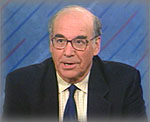 HAYNES
JOHNSON: Any time you break a barrier in American life and you respond
to the democratic ideal, it's a momentous event; of course it is. It
is not as momentous as in the past when you had a woman on the ticket
and there are going to be times when you're going to have black on a
ticket. But this is a big thing, there's no question about it. You've
got two percent of the American population that's Jewish. There has
not been any one on a ticket until right now. And that is in itself
a very important, significant thing. How it plays in politics, and the
arithmetic of politics and the divisions of politics, that's a whole
other thing. But the fact that it happened is about America.
HAYNES
JOHNSON: Any time you break a barrier in American life and you respond
to the democratic ideal, it's a momentous event; of course it is. It
is not as momentous as in the past when you had a woman on the ticket
and there are going to be times when you're going to have black on a
ticket. But this is a big thing, there's no question about it. You've
got two percent of the American population that's Jewish. There has
not been any one on a ticket until right now. And that is in itself
a very important, significant thing. How it plays in politics, and the
arithmetic of politics and the divisions of politics, that's a whole
other thing. But the fact that it happened is about America. 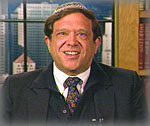 MICHAEL
LERNER: I think it's a terrific moment, a moment that we should all
celebrate. I think it's a great testimony to the possibilities in American
society. And yet I hope that we can extend this also to African Americans,
to gays and lesbians, to other groups that have been left out. But this
is a moment to celebrate America, and yet at the same time, to recognize
that there may be some problems with Lieberman. Lieberman has been turned
into The Jew. Well, I think if we said, well, a woman was nominated,
we'd also want to know who is she specifically and what does she stand
for. Here I'm not as joyous about the specific content of what Lieberman
stands for politically as I am about the fact that America has extended
itself to welcome in Jews. It's a great society to do that. We have
to remember that in the 20th century, Jews were restricted from colleges:
they weren't in medical schools, law schools. This was a society that
wasn't always open to Jews. Recently it has been, and this is a wonderful
confirmation of the best in America.
MICHAEL
LERNER: I think it's a terrific moment, a moment that we should all
celebrate. I think it's a great testimony to the possibilities in American
society. And yet I hope that we can extend this also to African Americans,
to gays and lesbians, to other groups that have been left out. But this
is a moment to celebrate America, and yet at the same time, to recognize
that there may be some problems with Lieberman. Lieberman has been turned
into The Jew. Well, I think if we said, well, a woman was nominated,
we'd also want to know who is she specifically and what does she stand
for. Here I'm not as joyous about the specific content of what Lieberman
stands for politically as I am about the fact that America has extended
itself to welcome in Jews. It's a great society to do that. We have
to remember that in the 20th century, Jews were restricted from colleges:
they weren't in medical schools, law schools. This was a society that
wasn't always open to Jews. Recently it has been, and this is a wonderful
confirmation of the best in America.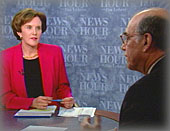 MARGARET
WARNER: That is groundbreaking, isn't it, Haynes? I mean, you had Lieberman
today start by offering a prayer. And it was much more extended than
we showed it.
MARGARET
WARNER: That is groundbreaking, isn't it, Haynes? I mean, you had Lieberman
today start by offering a prayer. And it was much more extended than
we showed it. 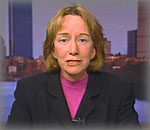 DORIS
KEARNS GOODWIN: Well, there's no question that when John Kennedy was
nominated for the presidency in 1960, he realized that it was a risk
that the Democratic Party was taking. Indeed, in his acceptance speech,
he gave thanks to the party for taking this hazardous risk of allowing
him to have this nomination, and he promised that he would deal with
it as well as he could. And he had to several times during his campaign
confront the issue, nowhere more strongly than in West Virginia at a
certain point, where he said, "you know, if I were to become President
and I were to take the oath on a Bible, I'm taking the oath to support
the Constitution. That means supporting separation of church and state.
If I violate that oath, I should be impeached. And I also would be sinning
against God because I took the oath on the Bible." So he knew he
had to confront it head on. The most amazing thing is after he won in
1960, I was trying to think today of what other Vice Presidents or other
characters were actually Catholic, and I could hardly remember, showing
that once these things break through, it's great.
DORIS
KEARNS GOODWIN: Well, there's no question that when John Kennedy was
nominated for the presidency in 1960, he realized that it was a risk
that the Democratic Party was taking. Indeed, in his acceptance speech,
he gave thanks to the party for taking this hazardous risk of allowing
him to have this nomination, and he promised that he would deal with
it as well as he could. And he had to several times during his campaign
confront the issue, nowhere more strongly than in West Virginia at a
certain point, where he said, "you know, if I were to become President
and I were to take the oath on a Bible, I'm taking the oath to support
the Constitution. That means supporting separation of church and state.
If I violate that oath, I should be impeached. And I also would be sinning
against God because I took the oath on the Bible." So he knew he
had to confront it head on. The most amazing thing is after he won in
1960, I was trying to think today of what other Vice Presidents or other
characters were actually Catholic, and I could hardly remember, showing
that once these things break through, it's great. 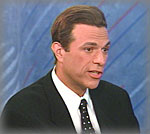 but
you have a chance to get a lot of big states that you otherwise would
not get. My guess is that in the last couple weeks in the counsels of
the Gore team, there must have been a memo of some kind saying, that
yes, there are some risks, but at the same time, Jewish American voters
and others will be so invigorated by this choice that you might have
a better chance to carry certain states.
but
you have a chance to get a lot of big states that you otherwise would
not get. My guess is that in the last couple weeks in the counsels of
the Gore team, there must have been a memo of some kind saying, that
yes, there are some risks, but at the same time, Jewish American voters
and others will be so invigorated by this choice that you might have
a better chance to carry certain states.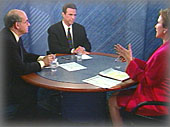 HAYNES
JOHNSON: I just want to say, reinforcing the idea of a risk, going back
to the John Kennedy in 1960, Democratic politicians didn't think he
could win because the anti-Catholic vote was so strong in the country.
Particularly in the South and in fact right up to the very end when
he went down to Houston, John Kennedy and spoke to the ministers there,
and afterwards he just said what Doris said earlier in West Virginia,
about he separates church and state. And he quoted Sam Rayburn who had
told him he couldn't win because he was Catholic -- said, that's the
way we like it out here, raw meat -- raw.
HAYNES
JOHNSON: I just want to say, reinforcing the idea of a risk, going back
to the John Kennedy in 1960, Democratic politicians didn't think he
could win because the anti-Catholic vote was so strong in the country.
Particularly in the South and in fact right up to the very end when
he went down to Houston, John Kennedy and spoke to the ministers there,
and afterwards he just said what Doris said earlier in West Virginia,
about he separates church and state. And he quoted Sam Rayburn who had
told him he couldn't win because he was Catholic -- said, that's the
way we like it out here, raw meat -- raw.